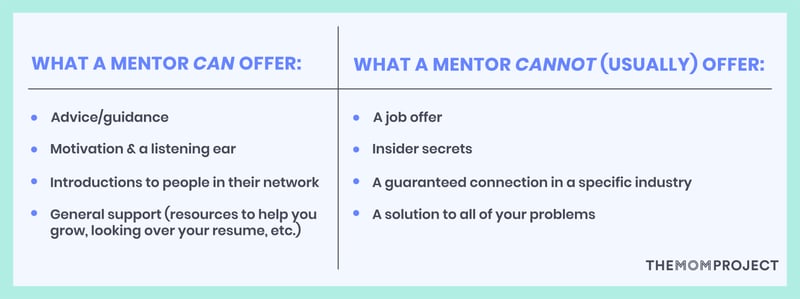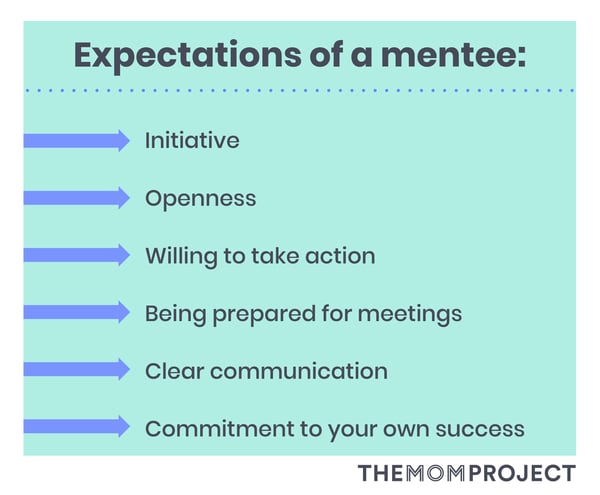In most aspects of life, it’s a little easier to get to the other side of a new or difficult situation when you have the help, support and guidance of someone who’s been there before and made it through successfully. When it comes to your career, that type of support often comes from a mentor.
Mentor-mentee relationships can look a lot of different ways. Some are strictly business relationships while others are a hybrid of business and life, some even evolve into full-blown friendships. Regardless of what they grow into, the root is the same, it’s about a mentor repurposing their own life experience to offer advice and support to a mentee.
However, in order for this relationship to flourish, both the mentee and mentor need to show up with realistic expectations of each other. Specifically, the mentee needs a firm understanding of what their mentor can and cannot do for them.
A mentor is not a magic career-genie who will make wishes come true by way of job offers or shared industry secrets, they are simply a person who is willing to take time out of their life to share lessons they’ve learned. On the flip-side, it’s appropriate for a mentee to expect their mentor to have a desire to add value, help the mentee achieve their goals and encourage them to reach their potential.

Managing expectations of each other and the partnership is essential to a successful mentor-mentee relationship. Here’s an overview of what that looks like.
What to expect from a mentor
A certain amount of expertise
Whatever it is that you’re hoping to get support and guidance in, your mentor should have an elevated level of experience in it. Ideally, this person will be within a step or two above your skill or job level so that you can easily relate with one another.
There isn’t a standard mentor profile however, instead the best person for you will be based on your needs. For example, if you are struggling with your interviewing skills, your mentor should have enough experience in interviewing that they can provide you with useful tips. If you’re looking for a general mentor to help you across your career, they might work in the same job role and/or industry as you. A mentor could even be a fellow-parent, with a few more years of working outside the home under their belt, who can help you develop realistic goals for pursuing career growth while also managing family responsibilities.
An investment in the partnership
One important thing a mentor will bring to the relationship may not seem like much on the surface, but it’s actually symbolic of how invested they are in you. It’s their time. They want to see a return on that investment, too, so they’ll use the time strategically to help you achieve your goals efficiently.
How often you meet with your mentor will vary based on your needs and the relationship. Typically, mentors meet with mentees on a pretty regular schedule, usually once or twice a month. Early on in the relationship, those meetings are typically structured with a clear purpose, but you can expect them to ask for updates on your goals, offer advice, help you network or actively engage in whatever they’re mentoring you in.
Ways a mentor can help
Again, your mentor is not a career superhero, they are a person who is trying to help you along in some aspect of your career. Here are some of the ways they can help.
- Offer assistance and support in establishing a realistic goal for you, and provide guidance in developing, modifying and managing a plan of action to achieve the goal
- Serve as a sounding board when you need to vent, offering suggestions if you’d like but respecting your space if you aren’t interested
- Give you useful feedback on your work to encourage you and help in areas that could use improvement
- Check-in with you by phone, text or email between meetings, asking for updates on major events, helping you debrief or offering general support
- Share industry-specific news and connect you with useful contacts
Things a mentor doesn’t do
- Actively do the work for you to achieve your goals
- Secure a job, a promotion or raise for you
- Serve as a sounding board at every meeting like a career-therapist
- Work with you if you’re unmotivated
- Offer only praise (or only criticism)
Finding a mentor
Before looking for a mentor, it’s important to decide what you would like help with in your career. Ask yourself questions like:
- Is there a specific skill I would like to cultivate?
- Do I need to increase my leadership abilities?
- Is it important that this mentor share my same industry?
Some companies offer mentorship programs that match employees with a more experienced leader. If your company offers this, it can be a great place to start.
It’s nice to have an outside perspective, too. You can usually find a mentor through your professional network. If you are already connected with someone who has achieved some of the career goals you’re interested in pursuing, reach out. Networking and industry events are great places to make new connections, too. You can ask a few questions about the person’s professional experience. If they share a common path or have a position you’d ultimately like to be in, they could be a great mentor.
Don’t count out casual networking, either. If you work remotely from the same coffee shop each week, for example, begin to notice who else is there working each week and strike up a conversation. Even if they aren’t the right fit for a mentor, they may be able to introduce you to someone who is.
Making the mentorship ask
Make your ask specific: “I’m interested in pursuing (a specific career skill or milestone) and would like to talk with you a bit about your experience.”
Remember that asking someone to be your mentor is asking for a favor since you’ll be using their time without compensation. You may have to make a few asks before you receive a yes. You can also ask your networking connections if they know of someone who might be a good mentor. A personal referral can go a long way in starting the relationship on the right foot.
What a mentor expects of a mentee
Managing your expectations for what your mentor can actually do for you will help you develop a strong, beneficial relationship with them, but it will be even stronger if you also go into the partnership with an understanding of what they expect from you.
- Take initiative in the relationship, it’s on you to keep it alive
- Be open to feedback, even if it’s not something you want to hear
- When you’re given advice, actively listen to it and put some of it into action, then report back with the results
- Show up to meetings prepared, have an agenda and make sure you’ve completed whatever “homework” you were assigned at previous meetings
- Follow through on commitments you make
- Come to meetings with some of your own ideas and strategies, don’t expect your mentor to be the only one who brainstorms
- Clearly state what it is you need from them, and if they start offering advice in an area where you don’t need or want it, let them know so you don’t waste their time

Mutual expectations
There are also some expectations that will apply to both of you in regards to the partnership. Think of these as an agreement or contract for the relationship.
- Be respectful of each other’s time, honor meeting times and if you need to cancel or reschedule, give as much notice as possible (last-minute cancellations should be reserved for emergency situations)
- Keep all conversations confidential, don’t leave a meeting and immediately share what you learned with a colleague (especially if it involves sensitive information)
- Check-in with each other on a regular basis to evaluate the relationship, maybe this is a short-term situation and you can cut back to one meeting a month, or perhaps the partnership is not beneficial because you just aren’t seeing eye to eye
- Respectfully accept each other’s differences in approach and opinions
- Be open to new ideas and be prepared to look at things from a different perspective
- Build trust by always being open and honest with each other
One way to make these expectations clear is to discuss them at your first meeting. This will give you both a firm understanding of what you need from each other for the relationship to be successful.
Building a strong relationship
If it seems like this relationship comes with a lot of conditions, you’re right, a mentorship is a relationship where you are expected to pull your own weight, no matter which role you are in. However, all of these conditions are there for a purpose and you’re going to be much more likely to develop a strong, beneficial and sustaining relationship with your mentor if you’re aware of them before you show up for your first meeting.
A good mentor-mentee partnership can do wonders for your career, whether it’s a long-term relationship or situational, and having clear expectations is a good way to set things up for success from the very start.
Get support throughout your journey
Access career opportunities with family-friendly employers, job search and career development resources, and a thriving community of moms and allies with The Mom Project. 



